红楼梦德语介绍
红楼梦回目120回中文及法文双语对照版

红楼梦回目第一回甄士隐梦幻识通灵贾雨村风尘怀闺秀Zhen Ombrage de Clerc fait connaissance,en rêve,Du jade des communications transcendantes;Jia Village sous Pluie,au vent de ce bas monde,S’éprend d’amour pour une fleur de gynécée.第二回贾夫人仙逝扬州城冷子兴演说荣国府Dame Lin née Jia fait ,par trépas,departVers le séjour des immortels;Leng dit le Florissant décrit,en long discours,L’état d’une maison ducale.第三回贾雨村夤缘复旧职林黛玉抛父进京都yín~缘〕攀缘上升,喻拉拢关系,向上巴结。
Lin Tel que Mer charge un puissant beau-frèreDe partonner son hôte précepteur;L’Aïeule Jia prend chez elle la filleD’une de ses trios filles trépassées.第四回薄命女偏逢薄命郎葫芦僧乱判葫芦案Un jeune infortunéfait, par malheur,rencontreD’une fille de piètre et maigre destine;Un échappédu Moutier de la CalebasseFait liquider,sous boisseau,un cas criminel.第五回游幻境指迷十二钗饮仙醪曲演红楼梦láo 酒的总称L’esprit du frérot Jade,en rêve,fait passageAu Domaine de la Supréme Vanité,Tandis que l’Immortelle veillant aux MiragesFait chanter les chansons du Songe au gynécée2.第六回贾宝玉初试云雨情刘姥姥一进荣国府Un frérot s’essaie aux jeuxDu nuage et de la pluie;La mémés’ouvre une entréeAu palais des ducs de Gloire.第七回送宫花贾琏戏熙凤宴宁府宝玉会秦钟La Jeune Dame You donne un festinPour honorer Wang Phénix triomphal;Cloche d’Or fait pour la Première foisRencontre avec Jia le Jade magique a.第八回比通灵金莺微露意探宝钗黛玉半含酸Le frérot Jade,par coup du destin,Fait connaissance du cadenas d’or;Par méméchance,àGrande Soeur Joyau,Est révéléle Jade transcendant.第九回恋风流情友入家塾起嫌疑顽童闹学堂À l’école privée un des deux garçonnetsS’éprend d’un camarade au coeur riche d’amour; Suscitant des soupçons les uns contre les autres, Des gamins turbulents mettent la classe en trouble a . 第十回金寡妇贪利权受辱张太医论病细穷源La veuve Jin,convoitant des profits,Endure humblement une honte;Le docteur Zhang,dissertant sur un cas,En fait l’analyse clinique.第十一回庆寿辰宁府排家宴见熙凤贾瑞起淫心Festin familial d’anniversaireAu Palais ducal de la Paix;Jia le Prodigieux voit Grande Soeur PhénixEt conçoit un dessein lubrique.第十二回王熙凤毒设相思局贾天祥正照风月鉴Grande Soeur Phénix tend,avec malice,Un piège funeste àson soupirant;Jia le Prodigieux est pris au miroirDes amours de brise et de clair de lune.第十三回秦可卿死封龙禁尉王熙凤协理宁国府À la Jeune Dame Qin est acquisUn titre posthume d’honneur;Grande Soeur Phénix administreUn deuil au Palais de la Paix.第十四回林如海捐官扬州城贾宝玉路谒北静王Les mânes de Lin Tel que MerFont retour au terroir natal;Au prince du Calme du Nord,Est présentéle frérot Jade.第十五回王凤姐弄权铁槛寺秦鲸卿得趣馒头庵kǎn Grande Soeur Phénix fait jeux de pouvoir,Au sein du Moutier dit du Seuil de Fer;Cloche d’Or,séduit,prend de l’agrémentDans le Couvent dit des Boules de Pain.第十六回贾元春才选凤藻宫秦鲸卿夭逝黄泉路L’Impériale Compagne Jia est,grace à son talent,promue Au Cabinet des Belles-Lettres;Le petit monsieur Cloche d’Or fait prématurément descente Aux bords des Sources infernales.第十七回大观园试才题对额贾宝玉机敏动诸宾Pour les noms à donner aux sites d’un grand parcLe talent d’un fils est par son père éprouvé;Une fille est près de rentrer chez ses parentsFêter la nuit de la première pansélène.第十八回林黛玉误剪香囊袋贾元春归省庆元宵L’Honorable Compagne impériale JiaRend,par grande faveur,visite à ses parents;Au cours du grand festin d’accueil familial,Le frérot Jade épand son talent littéraire.第十九回情切切良宵花解语意绵绵静日玉生香En belle nuit,d’amour sincère émue,Une fleur sachant user du langage;Jour calme;mû par le désir sans fin,Un jade en pouvoir d’émettre un parfum.第二十回王熙凤正言弹妒意林黛玉俏语谑娇音xuè开玩笑Grande Soeur Phénix,en termes congrus,Calme des tansports d’aigre jalousie;La soeurette Lin,par fin jeu de mots,Raille un vocatif à l’accent trop tendre.第二十一回贤袭人娇嗔箴宝玉俏平儿软语救贾琏zhēn劝告;劝诫Par ses tendres courroux,la sage caméristePense amender son jeune maître;Grâce à de doux propos,une adroite soubretteSauve,d’une scène,un Monsieur.第二十二回听曲文宝玉悟禅机制灯谜贾政悲谶语chèn 迷信人指将来会应验的话.Pour un jeune frérot,de couplets de théâtre,Résulte éveil au dyana;Des énigmes en vers,pour un Monsieur sagace,Présagent de mauvais destins.第二十三回西厢记妙词通戏语牡丹亭艳曲警芳心Grâce aux beaux vers du Dut du pavillon de l’ouest,S’exprime un jeu de propos tendres;Des séduisant couplets du Kiosque aux pivoines,S’émeut un coeur d’amour en fleur.第二十四回醉金刚轻财尚义侠痴女儿遗帕惹相思Un «Vajra soûl1»,faisant fi d’un vil gain’S’émeut d’amitiégénéreuse;Un mouchoir perdu de fille encor niceSuscite un double mal d’amour.第二十五回魇魔法姊弟逢五鬼红楼梦通灵遇双真zǐ本义:姐姐Par sortilège envoûtés,le frérotJade et PhénixÀ cinq demons sont en proie;Terni,l’abraxas de jade,à deux immortalisésDoit un réveil efficace.第二十六回蜂腰桥设言传心事潇湘馆春困发幽情Au Chalet des Deux Rivières,germe en secret un amour, Dans les langueurs du printemps;Au Pont en Taille de Guêpe,s’amorce subtil message Pour une affaire de coeur.第二十七回滴翠亭杨妃戏彩蝶埋香冢飞燕泣残红Auprés du Kiosque dit des Larmes d’Émeraude,Une beautésemblable à Yang la Favorite¹poursuit Des papillons;Devant le Tombeau dit des Arômes défunts,Une belle égale à la belle Aronde en Vol²,pleureDes fleurs flétries.第二十八回蒋玉菡情赠茜香罗薛宝钗羞笼红麝串Un jeune et bel acteur, épris d’amour,fait donD’un crêpe àparfum de garance;La belle au joyau d’or cache modestementUn chapelet de grains de musc.第二十九回享福人福深还祷福痴情女情重愈斟情D’heureuse fortune comblés,Des heureux font prière aux dieux de fortuneEncor plus heureuse;Le belle au coeur d’amour épris,À tant d’amour sent s’ajouter un anxieux surcroîtD’amour.第三十回宝钗借扇机带双敲龄官划蔷痴及局外Un éventail aidant,la belle au joyau d’or,Pour railler un railleur,use de l’ équivoque;En dessinant un nom de fleur et de jeune home,Une amoureuse affole un coeur non concerné.第三十一回撕扇子作千金一笑因麒麟伏白首双星Éventails déchirés,en rappel de l’histoireDu millier d’onces d’or n’achetant qu’un seul rire; Licornes d’or,en paire,annonçant longue vie,En cheveux blanchissants,d’un couple conjugal.第三十二回诉肺腑心迷活宝玉含耻辱情烈死金钏[D’avoir,àpleins poumos,calméle tourment qui lui tient au coeur,Un frérot demeure égaré;Supportant mal un déshonneur,une soubrette humiliéeSe donne,de rage,la mort.第三十三回手足耽耽小动唇舌不肖种种大承笞挞dān耳朵大而且下垂。
红楼梦-中英对照

红楼梦-中英对照简介《红楼梦》是中国古典小说的巅峰之作,由清代作家曹雪芹创作。
小说通过描绘贾、史、王、薛四大家族的兴衰和荣辱,展现了封建社会的残酷和虚伪。
作品以鲜明的人物形象、细腻的情感描写和深刻的社会触动而闻名。
主要人物1. 贾宝玉 (Jia Baoyu) - 故事的主角,被认为是贾家的灵魂和红楼梦的象征。
他聪明、多才多艺,但也感情起伏较大。
2. 林黛玉 (Lin Daiyu) - 贾宝玉的表妹,有着敏感和忧郁的性格。
她与贾宝玉之间有复杂的感情纠葛。
3. 薛宝钗 (Xue Baochai) - 薛家的女儿,贾宝玉的表妹。
她聪明善良,是贾宝玉的另一位红颜知己。
4. 王熙凤 (Wang Xifeng) - 贾府的女主人,具有聪明机智的头脑,善于处理家族内部的事务。
5. 贾母 (Grandmother Jia) - 贾宝玉的祖母,对贾家的财富和家族地位非常重视。
故事情节《红楼梦》以贾宝玉的命运为线索,展现了贾府的兴衰和家族成员之间的情感纠葛。
小说揭示了封建社会的种种不公和虚伪,对人性的复杂性展开了深刻的剖析。
故事中的人物形象丰满,涉及了爱情、亲情和友情等多种感情。
贾宝玉与林黛玉之间的纠葛引人关注,他们之间的爱情被社会条件所阻隔。
另一方面,贾宝玉与薛宝钗之间的感情表达了不同的价值观和人生观。
贾府的内部争斗和各种家族纷争为故事增添了紧张和戏剧性。
贾母及其权威、王熙凤的智慧和权谋以及其他许多人物的形象都给读者留下了深刻的印象。
结论《红楼梦》是一部描绘封建社会的经典小说,通过鲜明的人物形象和细腻的情感描写展现了人性的复杂性。
该作品深刻地反映了封建社会的虚伪和残酷,对现实社会仍然有着深远的影响。
注:本文中的人物名称为中文名,括号内为英文对应名。
译介学视角下《红楼梦》德译本研究

译介学视角下《红楼梦》德译本研究摘要:《红楼梦》是中国文学史上的巨著,也是中西方文化交流的重要作品之一。
德国是欧洲翻译和出版业最发达的国家之一,其文化及文学界对《红楼梦》的翻译及研究亦颇有建树。
本文在译介学的视角下,对《红楼梦》德译本的研究进行了探讨。
首先,本文介绍了德国翻译及出版业发展的背景,以及德国学者对《红楼梦》翻译及研究的贡献;其次,对比了不同翻译家的译本,分析了译者的翻译策略、语言特点及翻译中遇到的困难等问题;最后,本文总结了德译版《红楼梦》的成就及不足,并提出了继续深入研究的方向。
关键词:译介学;《红楼梦》;德译本;翻译策略;成功与不足译介学视角下《红楼梦》德译本研究一、德国翻译及出版业的发展背景德国是欧洲翻译和出版业最发达的国家之一。
其翻译及出版业不仅具有庞大的规模,还拥有深刻的文化背景和优秀的学者队伍。
在这样的背景下,德国学者对《红楼梦》的翻译及研究也是颇有建树的。
二、德译本的翻译策略及语言特点1. 《红楼梦》德译本的翻译策略翻译策略是指翻译者在翻译过程中所采取的手段和方法。
不同译者的翻译策略有所不同。
在德译版《红楼梦》的翻译中,可以看到翻译者们采取了各种策略来应对文化差异和语言难题。
其中最为常用的策略有直译、意译、注释、加译等。
2. 德译本的语言特点德语是一种句法结构复杂的语言,因此在翻译《红楼梦》时,译者要面对很多难题。
针对这些难题,德国翻译家采取了各种手段,如删节、添加图表和注释等,使德译版《红楼梦》在语言风格和词汇表达上更适应德语读者的阅读习惯。
三、德译本的成功与不足1. 成功德译版《红楼梦》在翻译质量和译本词汇的准确性上得到了广泛的认可。
德国翻译家注重对原汁原味的翻译,同时也能解决跨文化交流时的一些问题。
德国的有些翻译家则会在翻译过程中加入一些新的表达,使得整个翻译版本贴近了德国的文化生活,被广泛接受。
2. 不足德语与中文有很大的语言差异,翻译中容易出现信息损失等问题。
弗朗茨库恩及其《红楼梦》德文译本文学文本变译的个案研究

弗朗茨库恩及其《红楼梦》德文译本文学文本变译的个案研究一、本文概述Overview of this article本文旨在对弗朗茨·库恩(Franz Kuhn)及其《红楼梦》德文译本进行深入的个案研究,探讨其文学文本变译的过程及其影响。
弗朗茨·库恩作为德国汉学家,在20世纪初将《红楼梦》这部中国古典文学巨著翻译成德文,对中西文化交流产生了深远影响。
本研究将通过分析库恩的翻译策略、翻译风格及其在翻译过程中的文本调整,揭示其译本如何在保持原著精神的适应德国读者的阅读习惯和文化背景。
This article aims to conduct an in-depth case study of Franz Kuhn and his German translation of "Dream of the Red Chamber", exploring the process of literary text translation and its impact. Franz Kuhn, as a German sinologist, translated the masterpiece of Chinese classical literature, Dream of the Red Chamber, into German in the early 20th century, which had a profound impact on cultural exchange between China and the West.This study will reveal how Kuhn's translation strategy, translation style, and text adjustment during the translation process can adapt to the reading habits and cultural background of German readers while maintaining the spirit of the original work.本文的研究将涵盖以下几个方面:对弗朗茨·库恩的生平及其翻译活动进行简要介绍,以了解其翻译《红楼梦》的背景和动机。
红楼梦德语介绍
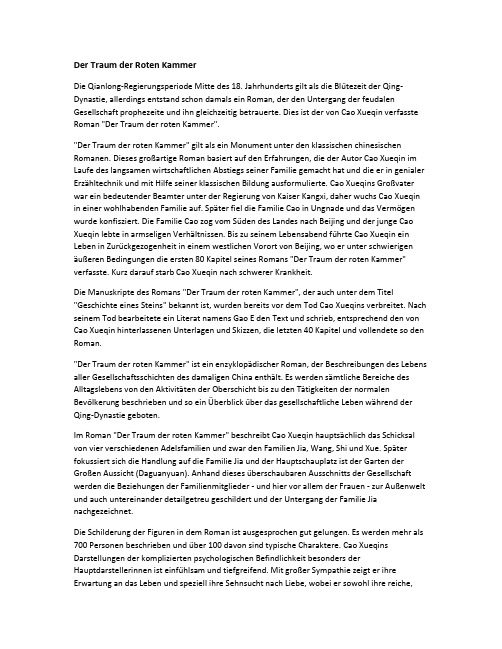
Der Traum der Roten KammerDie Qianlong-Regierungsperiode Mitte des 18. Jahrhunderts gilt als die Blütezeit der Qing-Dynastie, allerdings entstand schon damals ein Roman, der den Untergang der feudalen Gesellschaft prophezeite und ihn gleichzeitig betrauerte. Dies ist der von Cao Xueqin verfasste Roman "Der Traum der roten Kammer"."Der Traum der roten Kammer" gilt als ein Monument unter den klassischen chinesischen Romanen. Dieses großartige Roman basiert auf den Erfahrungen, die der Autor Cao Xueqin im Laufe des langsamen wirtschaftlichen Abstiegs seiner Familie gemacht hat und die er in genialer Erzähltechnik und mit Hilfe seiner klassischen Bildung ausformulierte. Cao Xueqins Großvater war ein bedeutender Beamter unter der Regierung von Kaiser Kangxi, daher wuchs Cao Xueqin in einer wohlhabenden Familie auf. Später fiel die Familie Cao in Ungnade und das Vermögen wurde konfisziert. Die Familie Cao zog vom Süden des Landes nach Beijing und der junge Cao Xueqin lebte in armseligen Verhältnissen. Bis zu seinem Lebensabend führte Cao Xueqin ein Leben in Zurückgezogenheit in einem westlichen Vorort von Beijing, wo er unter schwierigenäußeren Bedingungen die ersten 80 Kapitel seines Romans "Der Traum der roten Kammer" verfasste. Kurz darauf starb Cao Xueqin nach schwerer Krankheit.Die Manuskripte des Romans "Der Traum der roten Kammer", der auch unter dem Titel "Geschichte eines Steins" bekannt ist, wurden bereits vor dem Tod Cao Xueqins verbreitet. Nach seinem Tod bearbeitete ein Literat namens Gao E den Text und schrieb, entsprechend den von Cao Xueqin hinterlassenen Unterlagen und Skizzen, die letzten 40 Kapitel und vollendete so den Roman."Der Traum der roten Kammer" ist ein enzyklopädischer Roman, der Beschreibungen des Lebens aller Gesellschaftsschichten des damaligen China enthält. Es werden sämtliche Bereiche des Alltagslebens von den Aktivitäten der Oberschicht bis zu den Tätigkeiten der normalenBevölkerung beschrieben und so ein Überblick über das gesellschaftliche Leben während der Qing-Dynastie geboten.Im Roman "Der Traum der roten Kammer" beschreibt Cao Xueqin hauptsächlich das Schicksal von vier verschiedenen Adelsfamilien und zwar den Familien Jia, Wang, Shi und Xue. Später fokussiert sich die Handlung auf die Familie Jia und der Hauptschauplatz ist der Garten derGroßen Aussicht (Daguanyuan). Anhand dieses überschaubaren Ausschnitts der Gesellschaft werden die Beziehungen der Familienmitglieder - und hier vor allem der Frauen - zur Außenwelt und auch untereinander detailgetreu geschildert und der Untergang der Familie Jia nachgezeichnet.Die Schilderung der Figuren in dem Roman ist ausgesprochen gut gelungen. Es werden mehr als 700 Personen beschrieben und über 100 davon sind typische Charaktere. Cao Xueqins Darstellungen der komplizierten psychologischen Befindlichkeit besonders der Hauptdarstellerinnen ist einfühlsam und tiefgreifend. Mit großer Sympathie zeigt er ihre Erwartung an das Leben und speziell ihre Sehnsucht nach Liebe, wobei er sowohl ihre reiche,tiefgründige Menschlichkeit, als auch die Einengung durch die Umwelt und die traditionelle Gesellschaft ausführlich beschreibt, wodurch die geschilderten Figuren sehr plastisch wirken.Der Roman "Der Traum der roten Kammer" verfügt über einen beispiellos hohen künstlerischen Wert. Seine Ausdrucksweise, seine Struktur und Charakterisierung der Figuren stellen denHöhepunkt in der klassischen chinesischen Romanliteratur dar.。
红楼梦主要内容简介800字作文
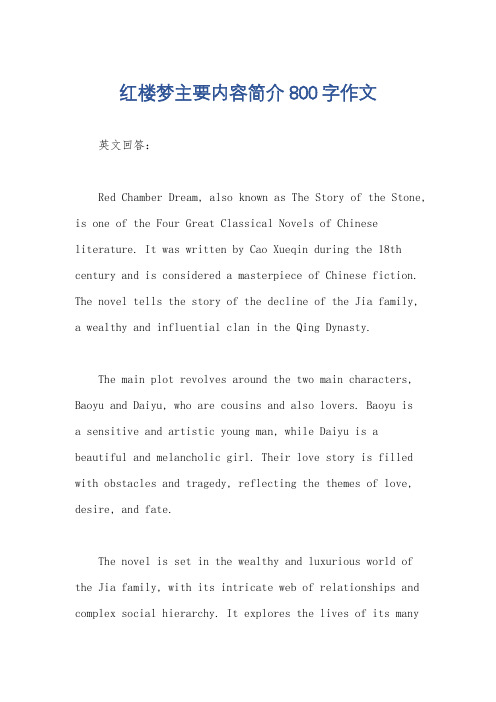
红楼梦主要内容简介800字作文英文回答:Red Chamber Dream, also known as The Story of the Stone, is one of the Four Great Classical Novels of Chinese literature. It was written by Cao Xueqin during the 18th century and is considered a masterpiece of Chinese fiction. The novel tells the story of the decline of the Jia family, a wealthy and influential clan in the Qing Dynasty.The main plot revolves around the two main characters, Baoyu and Daiyu, who are cousins and also lovers. Baoyu isa sensitive and artistic young man, while Daiyu is a beautiful and melancholic girl. Their love story is filled with obstacles and tragedy, reflecting the themes of love, desire, and fate.The novel is set in the wealthy and luxurious world of the Jia family, with its intricate web of relationships and complex social hierarchy. It explores the lives of its manycharacters, their struggles, and their desires. Throughvivid descriptions and detailed characterizations, the author presents a rich tapestry of Chinese society during the Qing Dynasty.The novel also delves into themes such as the role of women in society, the corrupting influence of wealth and power, and the fleeting nature of human existence. Itoffers a critique of the traditional Confucian values and explores the tensions between individual desires andsocietal expectations.中文回答:《红楼梦》,又称《石头记》,是中国文学四大名著之一。
维基百科《红楼梦》A Dream of Red Mansions
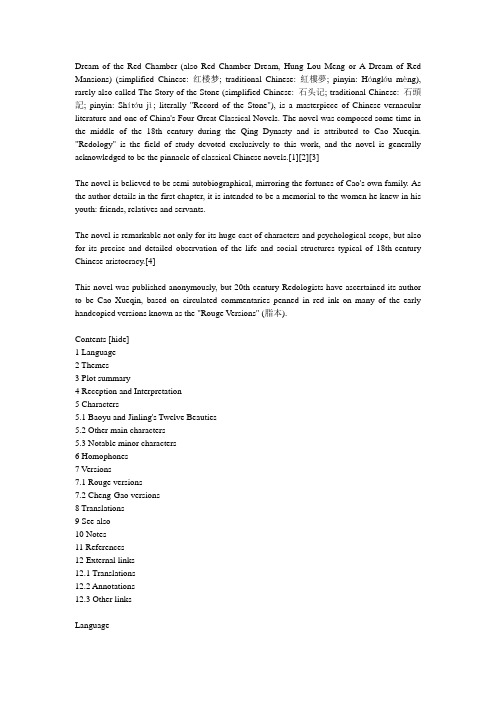
Dream of the Red Chamber (also Red Chamber Dream, Hung Lou Meng or A Dream of Red Mansions) (simplified Chinese: 红楼梦; traditional Chinese: 紅樓夢; pinyin: Hónglóu mèng), rarely also called The Story of the Stone (simplified Chinese: 石头记; traditional Chinese: 石頭記; pinyin: Shítóu jì; literally "Record of the Stone"), is a masterpiece of Chinese vernacular literature and one of China's Four Great Classical Novels. The novel was composed some time in the middle of the 18th century during the Qing Dynasty and is attributed to Cao Xueqin. "Redology" is the field of study devoted exclusively to this work, and the novel is generally acknowledged to be the pinnacle of classical Chinese novels.[1][2][3]The novel is believed to be semi-autobiographical, mirroring the fortunes of Cao's own family. As the author details in the first chapter, it is intended to be a memorial to the women he knew in his youth: friends, relatives and servants.The novel is remarkable not only for its huge cast of characters and psychological scope, but also for its precise and detailed observation of the life and social structures typical of 18th-century Chinese aristocracy.[4]This novel was published anonymously, but 20th-century Redologists have ascertained its author to be Cao Xueqin, based on circulated commentaries penned in red ink on many of the early handcopied versions known as the "Rouge V ersions" (脂本).Contents [hide]1 Language2 Themes3 Plot summary4 Reception and Interpretation5 Characters5.1 Baoyu and Jinling's Twelve Beauties5.2 Other main characters5.3 Notable minor characters6 Homophones7 Versions7.1 Rouge versions7.2 Cheng-Gao versions8 Translations9 See also10 Notes11 References12 External links12.1 Translations12.2 Annotations12.3 Other linksLanguageThe novel is written in vernacular rather than classical Chinese and helped establish the legitimacy of the vernacular idiom. Its author, Cao Xueqin, was well versed in Chinese poetry and in classical Chinese, having written tracts in the erudite semi-wenyan style. The novel's conversations were written in the Beijing Mandarin dialect, which was to become the basis of modern spoken Chinese, with influences from Nanjing-area Mandarin (where Cao's family lived in the early 1700s). [edit]ThemesA scene from the story, painted by Xu Baozhuan (born 1810).The novel is normally called Hung Lou Meng or Hóng Lóu Mèng (紅樓夢), literally "Red chamber dream". "Red tower" or "red chamber" is an idiom for the sheltered chambers where the daughters of wealthy families lived.[5] It also refers to a dream in Chapter 5 that Baoyu has, set in a "red chamber", where the fates of many of the characters are foreshadowed. "Chamber" is sometimes translated as "mansion" because of the scale of the Chinese word "樓", but "mansion" is thought to neglect the flavour of the word "chamber" and it is a mistranslation according to Zhou Ruchang.[6][7]The name of the main family, "賈", is a homophone with another Chinese character "假", which means false, fake, fictitious or sham. Thus, Cao Xueqin suggests that the novel's family is both a realistic reflection and a fictional or "dream" version of his own family.[edit]Plot summaryThe novel provides a detailed, episodic record of the two branches of the Jia clan, the Rongguo House (榮國府) and the Ningguo House (寧國府), who reside in two large adjacent family compounds in the capital. Their ancestors were made dukes, and as the novel begins the two houses are among the most illustrious families in the capital. One of the clan's offspring is made an Imperial Consort, and a gigantic landscaped interior garden, named the Prospect Garden, is built to celebrate this event. The novel describes the Jias' wealth and influence in great naturalistic detail, and charts the Jias' fall from the height of their prestige, following some thirty main characters and over four hundred minor ones. Eventually the Jia clan falls into disfavor with the Emperor, and their mansions are raided and confiscated.In the story's preface, a sentient Stone, abandoned by the Goddess Nüwa when she mended the heavens aeons ago, begs a Taoist priest and Buddhist monk to bring it with him to enjoy in the wordly world. The Stone and Divine Attendant-in-Waiting (神瑛侍者) are separate beings (while in Cheng-gao versions they are merged into the same character). The main character, Jia Baoyu (whose name means "precious jade"), is the adolescent heir of the family, a reincarnation of the Divine Attendant-in-Waiting. The Crimson Pearl Fairy (絳珠仙子) is incarnated as Baoyu's sickly cousin, the emotional Lin Daiyu, who loves Baoyu. Baoyu, however, is predestined in this life to marry another cousin, Xue Baochai. This love triangle against the backdrop of the family's declining fortunes forms the most well-known plot line in the novel.[edit]Reception and InterpretationFrom the first manuscripts circulating from the year 1759 until today, the novel has been a continuously successful bestseller not only in China, but all over the world in its various translations. One reason is that the story describes the unwillingness of a young man to grow up, a particularly resonant theme in literature.[citation needed] When the young man, Jia Baoyu, finally grows up, the paradise-like Prospect Garden of his childhood is destroyed and his friends are scattered to the four winds.[8][edit]CharactersA scene from the story, painted by Xu BaozhuanDream of the Red Chamber contains an extraordinarily large number of characters: nearly thirty are considered major characters, and there are over four hundred additional ones.[9] Jia Baoyu is the male protagonist. Females take center stage and are frequently shown to be more capable than their male counterparts. The names of the maids and bondservants are given in the original pinyin pronunciations and in David Hawkes' translation.[edit]Baoyu and Jinling's Twelve BeautiesJia Baoyu (simplified Chinese: 贾宝玉; traditional Chinese: 賈寶玉; pinyin: JiǎBǎoyù; Wade-Giles: Chia Pao-yu, Meaning: Precious Jade)The main protagonist, he is about 12- or 13-years-old when he is introduced in the novel.[10] The adolescent son of Jia Zheng (賈政) and his wife, Lady Wang (王夫人). Born with a piece of luminescent jade in his mouth (the Stone), Baoyu is the heir apparent to the Rongguo line (榮國府). Frowned on by his strict Confucian father, Baoyu reads Zhuangzi and Romance of the West Chamber rather than the Four Books basic to a classic Chinese education. Baoyu is highly intelligent, but hates the fawning bureaucrats that frequent his father's house. He shuns ordinary men, considering them morally and spiritually inferior to women. Sensitive and compassionate, Baoyu holds the view that "girls are in essence pure as water, and men are in essence muddled as mud." The book even indicates that he has had sexual affairs with some of his maids including Xiren. His surname Jia is a homonym for "False" and a boy named Zhen Baoyu ("True Baoyu") makes an appearance in the book.Lin Daiyu (Chinese: 林黛玉; pinyin: Lín Dàiyù; Wade-Giles: Lin Tai-yu, Meaning: Black Jade) Jia Baoyu's younger first cousin and his primary love interest. She is the daughter of Lin Ruhai (林如海), a Yangzhou scholar-official, and Lady Jia Min (賈敏), Baoyu's paternal aunt. She is thin, sickly, but beautiful in a way that is unconventional. She also suffers from a respiratory ailment which makes her cough. The novel proper starts in Chapter 3 with Daiyu's arrival at the Rongguo House shortly after the death of her mother. Fragile emotionally, prone to fits of jealousy, Daiyu is nevertheless an extremely accomplished poet and musician. The novel designates her one of the Jinling Twelve Women, and describes her as a lonely, proud and ultimately tragic figure. Daiyu is the reincarnation of the Crimson Pearl Flower, and the purpose of her mortal birth is to repay Baoyu (for watering her) with her tears.Xue Baochai (simplified Chinese: 薛宝钗; traditional Chinese: 薛寶釵; pinyin: XuēBǎo chāi; Wade-Giles: Hsueh Pao-chai, Meaning: Precious Virtue)Jia Baoyu's other first cousin. The only daughter of Aunt Xue (薛姨媽), sister to Baoyu's mother, Baochai is a foil to Daiyu. Where Daiyu is unconventional and hypersensitive, Baochai is sensible and tactful: a model Chinese feudal maiden. The novel describes her as beautiful and intelligent, but also reserved and following the rules of decorum. Although reluctant to show the extent of her knowledge, Baochai seems to be quite learned about everything, from Buddhist teachings to how not to make a paint plate crack. She is not keen on elaborately decorating her room and herself. The novel describes her room as being completely free of decoration, apart from a small vase of chrysanthemums. Baochai has a round face, fair skin, large eyes, and, some would say, a voluptuous figure in contrast to Daiyu's willowy daintiness. Baochai carries a golden locket with her which contains words given to her in childhood by a Buddhist monk. Baochai's golden locket and Baoyu's jade contain inscriptions that appear to complement one another perfectly. Their marriage is seen in the book as predestined.Jia Yuanchun (simplified Chinese: 贾元春; traditional Chinese: 賈元春; pinyin: JiǎYuán chūn; Wade-Giles: Chia Yuan-chun, Meaning: First of Spring)Baoyu's elder sister by about a decade. Originally one of the ladies-in-waiting in the imperial palace, Yuanchun later becomes an Imperial Consort, having impressed the Emperor with her virtue and learning. Her illustrious position as a favorite of the Emperor marks the height of the Jia family's powers. Despite her prestigious position, Y uanchun feels imprisoned within the four walls of the imperial palace. Redologists think that in the original lost ending, Y uanchun's sudden death precipitates the fall of the Jia family.Jia Tanchun (simplified Chinese: 贾探春; traditional Chinese: 賈探春; pinyin: Jiǎchūn; Wade-Giles: Chia Tan-chun, Meaning: Quest of Spring)Baoyu's younger half-sister by Concubine Zhao. Brash and extremely outspoken, she is almost as capable as Wang Xifeng. Wang Xifeng herself compliments her privately, but laments that she was "born in the wrong womb," since concubine children are not respected as much as those by first wives. She is also a very talented poet. Tanchun is nicknamed "Rose" for her beauty and her prickly personality.A Qing Dynasty woodcut print depicting Xiren. By Gai Qi (born 1773)Shi Xiangyun (simplified Chinese: 史湘云; traditional Chinese: 史湘雲; pinyin: ShǐXiāng yún; Wade-Giles: Shih Hsiang-yun, Meaning: Xiang River Mist)Jia Baoyu's younger second cousin. Grandmother Jia's grandniece. Orphaned in infancy, she grows up under her wealthy maternal uncle and aunt who use her unkindly. In spite of this Xiangyun is openhearted and cheerful. A comparatively androgynous beauty, Xiangyun looks good in men's clothes (once she put on Baoyu's clothes and Grandmother Jia thought she was he), and loves to drink and eat barbecued meat. She is forthright and without tact, but her forgiving nature takes the sting from her casually truthful remarks. She is well educated and as talented a poet as Daiyu or Baochai.Miaoyu (Chinese: 妙玉; pinyin: Miàoyù; Wade-Giles: Miao-yu, Meaning: Wonderful/Clever Jade)a young nun from Buddhist cloisters of the Rong-guo house. Extremely beautiful and learned, while also extremely aloof, haughty and unsociable. She also has an obsession with cleanliness.The novel says she was compelled by her illness to become a nun, and shelters herself under the nunnery in Prospect Garden to dodge political affairs. She likes Zhuangzi's articles.Jia Yingchun (simplified Chinese: 贾迎春; traditional Chinese: 賈迎春; pinyin: JiǎYíng chūn; Wade-Giles: Chia Ying-chun, Meaning: Welcome Spring)Second female family member of the generation of the Jia household after Yuanchun, Yingchun is the daughter of Jia She, Baoyu's uncle and therefore his elder first cousin. A kind-hearted, weak-willed person, Yingchun is said to have a "wooden" personality and seems rather apathetic toward all worldly affairs. Although very pretty and well-read, she does not compare in intelligence and wit to any of her cousins. Yingchun's most famous trait, it seems, is her unwillingness to meddle in the affairs of her family. Eventually Yingchun marries a new favorite of the imperial court, her marriage being merely one of her father's desperate attempts to raise the declining fortunes of the Jia family. The newly married Yingchun becomes a victim of domestic abuse and constant violence at the hands of her cruel, abusive husband.Jia Xichun (simplified Chinese: 贾惜春; traditional Chinese: 賈惜春; pinyin: JiǎXīchūn; Wade-Giles: Chia Hsi-chun, Meaning: Compassion Spring)Baoyu's younger second cousin from the Ningguo House, but brought up in the Rongguo House. A gifted painter, she is also a devout Buddhist. She is the sister of Jia Zhen, head of the Ningguo House. At the end of the novel, after the fall of the house of Jia, she gives up her worldly concerns and becomes a Buddhist nun. She is the second youngest of Jinling's Twelve Beauties, described as a pre-teen in most parts of the novel.Wang Xifeng (simplified Chinese: 王熙凤; traditional Chinese: 王熙鳳; pinyin: Wáng Xīfèng; Wade-Giles: Wang Hsi-feng, Meaning: Splendid Phoenix), alias Sister Feng.Baoyu's elder cousin-in-law, young wife to Jia Lian (who is Baoyu's paternal first cousin), niece to Lady Wang. Xifeng is hence related to Baoyu both by blood and marriage. An extremely handsome woman, Xifeng is capable, clever, amusing and, at times, vicious and cruel. Undeniably the most worldly of the women in the novel, Xifeng is in charge of the daily running of the Rongguo household and wields remarkable economic as well as political power within the family. Being a favorite of Grandmother Jia, Xifeng keeps both Lady Wang and Grandmother Jia entertained with her constant jokes and amusing chatter, playing the role of the perfect filial daughter-in-law, and by pleasing Grandmother Jia, ruling the entire household with an iron fist. One of the most remarkable multi-faceted personalities in the novel, Xifeng can be kind-hearted toward the poor and helpless. On the other hand, Xifeng can be cruel enough to kill. Her feisty personality, her loud laugh, and her great beauty contrast with many of the frail, weak-willed beauties of the literature of 18th-century China.Jia Qiaojie (simplified Chinese: 贾巧姐; traditional Chinese: 賈巧姐; pinyin: JiǎQiǎojiě; Wade-Giles: Chia Chiao-chieh, Meaning: Timely Older Sister)Wang Xifeng's and Jia Lian's daughter. She is a child through much of the novel. After the fall of the house of Jia, in the version of Gao E and Cheng Weiyuan, she marries the son of a wealthy rural family introduced by Granny Liu and goes on to lead a happy, uneventful life in the countryside.Li Wan (simplified Chinese: 李纨; traditional Chinese: 李紈; pinyin: LǐWán; Wade-Giles: Li Wan, Meaning: White Silk)Baoyu's elder sister-in-law, widow of Baoyu's deceased elder brother, Jia Zhu (賈珠). Her primary task is to bring up her son Lan and watch over her female cousins. The novel portrays Li Wan, ayoung widow in her late twenties, as a mild-mannered woman with no wants or desires, the perfect Confucian ideal of a proper mourning widow. She eventually attains high social status due to the success of her son at the Imperial Exams, but the novel sees her as a tragic figure because she wasted her youth upholding the strict standards of behavior.Qin Keqing (Chinese: 秦可卿; pinyin: Qín Kěqīng; Wade-Giles: Ch'in Ko-ching)Daughter-in-law to Jia Zhen. Of all the characters in the novel, the circumstances of her life and early death are amongst the most mysterious. Apparently a very beautiful and flirtatious woman, she carried on an affair with her father-in-law and dies before the second quarter of the novel. Her bedroom is bedecked with priceless artifacts belonging to extremely sensual women, both historical and mythological. In her bed, Bao Y u first travels to the Land of Illusion where he has a sexual encounter with Two-In-One, who represents Xue Baochai and Lin Daiyu. Two-in-One's name is also Keqing, making Qin Keqing also a significant character in Bao Yu's sexual experience. The original twelve songs hint that Qin Keqing hanged herself.[edit]Other main charactersGrandmother Jia (simplified Chinese: 贾母; traditional Chinese: 賈母; pinyin: Jiǎmǔ), née Shi. Also called the Matriarch or the Dowager, the daughter of Marquis Shi of Jinling. Grandmother to both Baoyu and Daiyu, she is the highest living authority in the Rongguo house and the oldest and most respected of the entire clan, yet also a doting person. She has two sons, Jia She and Jia Zheng, and a daughter, Min, Daiyu's mother. Daiyu is brought to the house of the Jias at the insistence of Grandmother Jia, and she helps Daiyu and Baoyu bond as childhood playmates and, later, kindred spirits.Jia She (simplified Chinese: 贾赦; traditional Chinese: 贾赦; pinyin: JiǎShè; Wade-Giles: Chia Sheh, Meaning: "To Pardon (a Convict)")T elder son of the Dowager. He is the father of Jia Lian and Jia Yingchun. He is a treacherous and greedy man, and an extreme womanizer.Jia Zheng (simplified Chinese: 贾政; traditional Chinese: 賈政; pinyin: JiǎZhèng; Wade-Giles: Chia Cheng, Meaning: "Political/Government")Baoyu's father, the younger son of the Dowager. He is disciplinarian and Confucian scholar. Afraid his one surviving son will turn bad, he imposes strict rules on his son, and uses occasional corporal punishment. He has a wife, Lady Wang, and two concubines: Zhao and Zhou.Jia Lian (simplified Chinese: 贾琏; traditional Chinese: 賈璉; pinyin: JiǎLián; Wade-Giles: Chia Lien, Meaning: "Vessel for Grain")Xifeng's husband and Baoyu's paternal elder cousin, a notorious womanizer whose numerous affairs cause much trouble with his jealous wife, including affairs with men that are not known by his wife. His pregnant concubine (Second Sister You) eventually dies by his wife's engineering. He and his wife are in charge of most hiring and monetary allocation decisions, and often fight over this power.Xiangling (香菱, "Fragrant Water Caltrop") —the Xues' maid, born Zhen Yinglian (甄英蓮, literally "The real outstanding lotus", a homophone with "deserving pity"), the kidnapped and lost daughter to Zhen Shiyin (甄士隱), the country gentleman in Chapter 1. Her name is changed to Qiuling (秋菱) by Xue Pan's spoiled wife, Xia Jin'gui (夏金桂).Pinger (平兒, "Peaceful")Xifeng's chief maid and personal confidante; also concubine to Xifeng's husband, Jia Lian. Theconsensus among the novel's characters seem to be that Pinger is beautiful enough to rival the mistresses in the house. Originally Xifeng's maid in the Wang household, she follows Xifeng as part of her "dowry" when Xifeng marries into the Jia household. She handles her troubles with grace, assists Xifeng capably and appears to have the respect of most of the household servants. She is also one of the very few people who can get close to Xifeng. She wields considerable power in the house as Xifeng's most trusted assistant, but uses her power sparingly and justly. Xue Pan (Chinese: 薛蟠; pinyin: Xuē Pán; Wade-Giles: Hsueh Pan, Meaning: "To Coil") Baochai's older brother, a dissolute, idle rake who was a local bully in Jinling. He was known for his amorous exploits with both men and women. Not particularly well educated, he once killed a man over a servant-girl (Xiangling) and had the manslaughter case hushed up with money. Granny Liu (simplified Chinese: 刘姥姥; traditional Chinese: 劉姥姥; pinyin: LiúLǎolao)A country rustic and distant relation to the Wang family, who provides a comic contrast to the ladies of the Rongguo House during two visits. She eventually rescues Qiaojie from her maternal uncle, who wanted to sell her.Lady Wang (Chinese: 王夫人; pinyin: Wáng Fūren)A Buddhist, primary wife of Jia Zheng. Because of her purported ill-health, she hands over the running of the household to her niece, Xifeng, as soon as the latter marries into the Jia household, although she retains overall control over Xifeng's affairs so that the latter always has to report to her. Although Lady Wang appears to be a kind mistress and a doting mother, she can in fact be cruel and ruthless when her authority is challenged. She pays a great deal of attention to Baoyu's maids to make sure that Baoyu does not develop romantic relationships with them.Aunt Xue (simplified Chinese: 薛姨妈; traditional Chinese: 薛姨媽; pinyin: Xuē Yímā), née WangBaoyu's maternal aunt, mother to Pan and Baochai, sister to Lady Wang. She is kindly and affable for the most part, but finds it hard to control her unruly son.QingwenXiren (simplified Chinese: 袭人; traditional Chinese: 襲人; pinyin: Xírén, Meaning: "Assails Men")Baoyu's principal maid and his unofficial concubine. Originally the maid of the Dowager, Xiren was given to Baoyu because of her extreme loyalty toward the master she serves. Considerate and forever worried about Baoyu, she is the partner of his first adolescent sexual encounter in the real world in Chapter 5.Qingwen (Chinese: 晴雯; pinyin: Qíngwén, Meaning: "Clear Mulitcolored Clouds")Baoyu's handmaiden. Brash, haughty and the most beautiful maid in the household, Qingwen is said to resemble Daiyu very strongly. Of all of Baoyu's maids, she is the only one who dares to argue with Baoyu when reprimanded, but is also extremely devoted to him. She is disdainful of Xiren's attempt to use her sexual relation with Baoyu to raise her status in the family. Lady Wang later suspected her of having an affair with Baoyu and publicly dismisses her on that account; angry at the unfair treatment and of the indignities and slanders that attended her as a result, Qingwen dies of an illness shortly after leaving the Jia household.Yuanyang ((Chinese: 鸳鸯; pinyin: Yuānyang, Meaning: "Mandarin Duck")The Dowager's chief maid. She rejected a marriage proposal (as concubine) to the lecherous Jia She, Grandmother Jia's eldest son.Mingyan (simplified Chinese: 茗烟; traditional Chinese: 茗煙; pinyin: Míngyān, Meaning: "Tea Mist")Baoyu's page boy. Knows his master like the back of his hand.Zijuan (simplified Chinese: 紫鹃; traditional Chinese: 紫鵑; pinyin: Zǐjuān; Wade-Giles: Tzu-chuan, Meaning: "Purple Cuckoo")Daiyu's faithful maid, ceded by the Dowager to her granddaughter.Xueyan (Chinese: 雪雁; pinyin: Xuěyàn, Meaning: "Snow Goose")Daiyu's other maid. She came with Daiyu from Yangzhou, and comes across as a young, sweet girl.Concubine Zhao (simplified Chinese: 赵姨娘; traditional Chinese: 趙姨娘; pinyin: Zhào Yíniáng )A concubine of Jia Zheng. She is the mother of Jia Tanchun and Jia Huan, Baoyu's half-siblings. She longs to be the mother of the head of the household, which she does not achieve. She plots to murder Baoyu and Xifeng with black magic, and it is believed that her plot cost her her own life. [edit]Notable minor charactersQin Zhong (秦鐘) —Qin Keqing's handsome younger brother. He looks like a girl as well as being as shy as a girl. He is a good friend and classmate to Baoyu. He was bullied by other student at school, who say that he is homosexual. He has had a romantic relationship with a teenage nun. He dies young.Jia Lan (賈蘭) —Son of Baoyu's deceased older brother Jia Zhu and his virtuous wife Li Wan. Jia Lan is an appealing child throughout the book and at the end succeeds in the imperial examinations to the credit of the family.Jia Zhen (賈珍) —Head of the Ningguo House, the elder branch of the Jia family. He has a wife, Lady Yu, a younger sister, Jia Xichun, and many concubines. He is extremely greedy and the unofficial head of the clan, since his father has retired. He has an adulterous affair with his daughter-in-law, Qin Keqing.Lady You (尤氏) —wife of Jia Zhen. She is the sole mistress of the Ningguo House. You is also spelled as Yu.Jia Rong (賈蓉) —Jia Zhen's son. He is the husband of Qin Keqing. An exact copy of his father, he is the Cavalier of the Imperial Guards.Second Sister You (尤二姐) —Concubine to Jia Lian. She is a beautiful and modest young lady, a concubine who was treated so badly by Wang Xifeng that she commits suicide by swallowing gold. She is the elder sister of Third Sister You. You is also spelled Y u.Lady Xing (邢夫人) —Jia She's wife. She is Jia Lian's mother.Jia Huan (賈環) —son of Concubine Zhao. He and his mother are both reviled by the family, and he carries himself like a kicked dog. He shows his malign nature by spilling candle wax, intending to blind Bao Yu.Sheyue (麝月, Musk) —Baoyu's main maid after Xiren and Qingwen. She is beautiful and caring, a perfect complement to Xiren.Qiutong (秋桐) —Jia Lian's other concubine. Originally a maid of Jia She, she is given to Jia Lian as a concubine. She is a very proud and arrogant woman.Sister Silly (傻大姐) —a maid who does rough work for the Dowager. She is guileless but amusing and caring. In the Gao E and Cheng Weiyuan version, She unintentionally informs Daiyuof Baoyu's secret marriage plans.[edit]HomophonesThe homophones are one of the features of this book. In this book, many character and place names have a special meanings. Rouge Inkstone's note pointed out some of their hidden meanings. Homophones found by Redologies are marked with *.[citation needed]Huzhou (胡州) —Groundless speaking (胡謅)Zhen Shiyin (甄士隱) —That under which true things are hidden (真事隱)Zhen Yinglian (甄英莲, Zhēn Yīng lián) — Truly deserving pity (真應憐, Zhēn Yīng lián)Feng Su (封肅) —Custom (風俗)Huo Qi (霍啟) —Disaster starts / Fire is on* (禍起/火起)Jia (賈, the surname of the main family) - False, fake (假)Zhen (甄, the surname of the other main family) - Real, true (眞)Jia Yucun (賈雨村(號雨村)) —Unreal words exist* (假語存)Jia Hua (姓賈名化) - Unreal words (假話)Shifei (字時飛) - That which is not real after all (實非)Qing Keqing (秦可卿) —Sensation should be despised or Sensation can overthrow (情可輕or 情可傾)*Yuanchun, Yingchun, Tanchun, Xichun (元迎探惜) —Originally, should sigh (原應嘆息)Dian'er (靛兒) —Scapegoat (墊兒)*[citation needed]Zhang Youshi (張友士) —Something is going to be on (将有事)*[citation needed]Jia Mei (賈玫) —Suppose disappear (假沒, 假設沒有這個人)*[citation needed]Wei Ruolan (衛若蘭, Wèi ruò) — The given name Ruolan (若蘭) means "like an orchid." The family name Wèi (衛) has the same pronunciation as 味, meaning "scent or taste." Wei Ruolan is then a homophone for "with a scent like an orchid."*[edit]VersionsThe textual problems of the novel are extremely complex and have been the subject of much critical scrutiny, debate and conjecture in modern times.[11] Cao did not live to publish his novel, and only hand-copied manuscripts survived after his death until 1791, when the first printed version was published. This printed version, known as the Chenggao edition, contains edits and revisions not authorised by the author.[edit]Rouge versionsThe novel was anonymous until the 20th century. After Hu Shi's analyses, it is generally agreed that Cao Xueqin wrote the first 80 chapters of the novel.Up until 1791, the novel circulated merely in scribal transcripts. These early hand-copied versions end abruptly at the latest at the 80th chapter. The earlier ones furthermore contain transcribed comments and annotations in red ink from unknown commentators. These commentators' remarks reveal much about the author as a person, and it is now believed that some of them may even be。
《红楼梦》意大利语前言
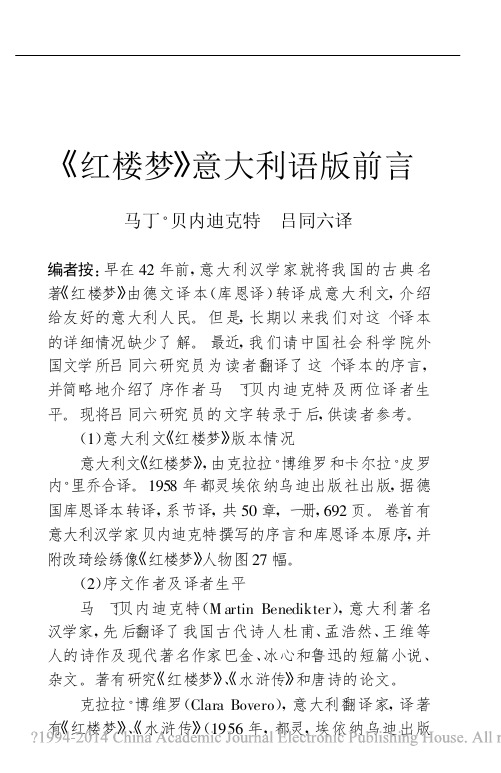
《红楼梦》意大利语版前言马丁·贝内迪克特 吕同六译编者按:早在42年前,意大利汉学家就将我国的古典名著《红楼梦》由德文译本(库恩译)转译成意大利文,介绍给友好的意大利人民。
但是,长期以来我们对这个译本的详细情况缺少了解。
最近,我们请中国社会科学院外国文学所吕同六研究员为读者翻译了这个译本的序言,并简略地介绍了序作者马丁·贝内迪克特及两位译者生平。
现将吕同六研究员的文字转录于后,供读者参考。
(1)意大利文《红楼梦》版本情况意大利文《红楼梦》,由克拉拉·博维罗和卡尔拉·皮罗内·里乔合译。
1958年都灵埃依纳乌迪出版社出版,据德国库恩译本转译,系节译,共50章,一册,692页。
卷首有意大利汉学家贝内迪克特撰写的序言和库恩译本原序,并附改琦绘绣像《红楼梦》人物图27幅。
(2)序文作者及译者生平马丁·贝内迪克特(M artin Benedikter),意大利著名汉学家,先后翻译了我国古代诗人杜甫、孟浩然、王维等人的诗作及现代著名作家巴金、冰心和鲁迅的短篇小说、杂文。
著有研究《红楼梦》、《水浒传》和唐诗的论文。
克拉拉·博维罗(Clara Bovero),意大利翻译家,译著有《红楼梦》、《水浒传》(1956年,都灵,埃依纳乌迪出版社出版,由德国库恩译本转译)。
卡尔拉·皮罗内·里乔(carla Pirrome Riccio ),意大利翻译家。
《红楼梦》,是一幅姿色各异的人物的画卷,这些人物在传统的核心内活动,以别开生面的方式融入和活跃于环境之中;小说的中心事件感受和酿成于内心世界。
富于情趣而又清晰可见的心底波澜,取代了在错综复杂的民俗背景上塑造的屡见不鲜的、粗俗的、模式化的人物。
内心生活是这部作品最为率真、最为耀眼的重点,从而保障了它的成功,赋予从最主要的人物到边缘人物以鲜明的心态和面影。
超现实的神秘性在小说的序幕和尾声中占主导地位,并且逼迫着黛玉和宝玉之间迷人的爱情故事,但被置于生活的不可抗拒的阴谋和老一代没落的氛围之中的爱情故事,依然贯串小说始终,并保持着自身的纯洁。
释意理论下《红楼梦》的章回目录德译

释意理论下《红楼梦》的章回目录德译作者:王晓宁来源:《牡丹》2017年第15期《红楼梦》的章回目录在作品中具有提纲挈领的作用,而章回目录的翻译则直接影响到目的语读者对该部文学作品的理解与接受程度。
释意理论对《红楼梦》章回目录的德译具有相当的适应性,在施华慈和沃斯勒的合译本中,人们经常可以看到释意理论关照下,这种注重传递原文“意义”的翻译处理。
在《红楼梦》外译的研究中,学界大多集中探讨其英文译本,对其德文译本则缺少关照。
《红楼梦》最早的德文节译本由德国人弗兰茨·库恩(Franz Kuhn)于1932年完成,这个译本在欧洲具有一定影响,多年来不断修订和重印,并被转译成英、法、意、荷兰等多国文字。
2007至2009年,欧洲大学出版社出版了《红楼梦》最新的德文译本,由德国汉学家莱纳·施华慈(Rainer Schwarz负责前八十回)和马丁·沃斯勒(Martin Woesler负责后四十回)共同完成,是迄今为止唯一的德语全译本。
笔者以该德译本的章回目录翻译为研究对象,在释意理论的指导下,讨论该理论对章回目录德译的适应性,探究译者翻译章回目录时使用的翻译策略,并试图对形成的翻译效果进行评价。
一、《红楼梦》章回目录的特点《红楼梦》全书一百二十回,每回皆以八字的对句构成,形式整齐划一,同时兼具音韵美,运用叠音、叠韵等手法使之平仄协调,读来朗朗上口,如“情切切良宵花解语,意绵绵静日玉生香”(第十九回)。
除其形式特征外,其章回目录还有上下句意群分段处一致的特点。
基本句型为“3+2+3”“3+3+2”“3+1+4”“4+2+2”“4+4”,且上下句对仗工整,词性到词义皆相对或相近。
“3+2+3”的意群划分句型为《红楼梦》章回目录的基本格式,如“王熙凤毒设相思局,贾天祥正照风月鉴”(第十二回),该句型每句三顿,每顿字数为两个字或三个字,给人以抑扬顿挫之感。
此外,大量运用借代、谐音、双关、典故等多种修辞手法是《红楼梦》回目的又一特点,如“滴翠庭杨妃戏彩蝶,埋香冢飞燕泣残红”(第二十七回)。
《红楼梦》德英译本人名翻译特色比较

《红楼梦》德英译本人名翻译特色比较《红楼梦》的人物命名极具特色。
本文选取大卫·霍克斯所译英文版和弗兰兹·库恩所译德文版中一些典型人名,从归化、异化角度对其翻译特色进行分析、比较。
为了作品在目标语者中的传播和普及,译者应该更多地采用归化翻译。
标签:《红楼梦》人名归化异化一、引言《红楼梦》是浩如烟海的中国古典文学宝库中一颗极为璀璨的明珠,在中国文学史上享有崇高地位。
其各种译本也在世界范围内广泛流传,向全世界展现了博大精深的中国传统文化,为外国人了解中国传统文化打开了一个窗口。
如此一部彪炳史册的巨著,加之中文的特殊性和复杂性,《红楼梦》的翻译,难度之大,可想而知。
然而两位汉学家——《红楼梦》英文版译者大卫·霍克斯和德文版译者弗兰兹·库恩克服了重重困难,出色地完成了这一艰巨任务。
笔者将从一个小的切入点——人名翻译,对德英译本不同的翻译风格和技巧做一简要分析。
自古以来,中国人就对起名字十分重视。
早在春秋战国时代,孔子就有言:“名不正则言不顺,言不顺则事不成。
”除了极具重要性之外,中国人取名字还是一种艺术。
张爱玲在《必也正名乎》中说道:“为人取名字是一个轻便的,小规模的创造。
”相比之下,西方人取名则更像是一种程序:在神话传说或宗教经典中挑选一个现成的即可。
这种文化背景上的差异也给翻译造成了很大挑战。
《红楼梦》人物姓名尤其复杂。
全书人物近千,关系纷繁复杂。
作者给这些人物的命名手法极具艺术性,倾注了作者的个人感情,个中滋味若非母语者很难体会。
例如采用大量谐音等双关语:甄士隐(真事隐)、贾雨村(假语存)、卜世仁(不是人)、甄英莲(真应怜)等,既突出了人物性格,又暗示了人物命运。
这些名字体现了汉语语境下丰富的文化内涵,被翻译成另一种语言,脱离了原有语境后难免会出现信息缺损。
译者在“达”和“雅”之间难免会顾此失彼。
二、翻译理论目前学界比较通行的翻译理论即为翻译的归化和异化。
翻译的归化和异化是由Schleiermacher(施莱尔马赫)提出的。
红楼梦的有趣外文翻译

红楼梦的有趣外文翻译红楼梦的有趣外文翻译红楼梦早在1830年,就有了英文译本,当时,英国皇家学会会员John Davis翻译了《红楼梦》第3回的片段,这是世界上第一个英文节译本。
《红楼梦》的国外传播也从此拉开序幕。
在外国人眼里,红楼梦是一部什么样的书呢?《红楼梦》德文译本作者,德国著名汉学家、翻译家弗朗茨库恩这么评价:“一百年来,《红楼梦》这个名字就像一座陌生的雄伟山岳从虚无缥缈的淡蓝色远方,进入欧洲智慧的视野,同时吸引着人们,使他们感到吃惊。
人们私下里传说议论着这座高山不可征服的岩石裂隙和悬崖绝壁。
内行们暗地里充满惊异,悄悄地说,这真是小说的庞然大物啊!竟有一百多个出场人物!有谁敢于走进它呢?……即使我的翻译不够完整,我也要作为第一位欧洲人去征服《红楼梦》的顶峰……”《红楼梦》是我们民族文学的顶峰,是中华文化的一颗明珠,而外国人通过翻译《红楼梦》,也在力图摘取这颗中华民族文化的明珠。
他们是真诚的,不过,由于中西文化的冲突和隔阂,无论是英文译本,还是德文译本,俄文译本,都存在很多不如意的地方,所以,当我们中国人为更好地理解《红楼梦》而艰苦努力的时候,外国人也在为翻译《红楼梦》而奋斗,都是为了这部人类文学的奇特作品。
下面,我点评一些《红楼梦》的'英文译本,从一个角度,我们可以看到中西文化的隔阂,还有我们《红楼梦》独特的语言魅力,既温习了祖国语文,又能提高一点英文,这是两全其美的有意义的事情。
大家都知道《红楼梦》里的人名,有着独特的学问,一方面,凝聚着祖国语言的魅力,另一方面,又寄托着深刻的含义,外国人翻译《红楼梦》,首先就遇到了翻译人物姓名的障碍,其中,有翻译得不错的,也有翻译的离题万里,甚至相当搞笑。
一、啼笑皆非的英文译名1. 袭人,袭击男人?袭人,在英文译本(杨宪益译本)中,是这样翻译的:Hsi-jen,(assails men),"Hsi-jen"是音译,问题出在()里的注释,本来译者是为了给英文读者解释这个人名的意思。
《红楼梦》在德国的译介与接受概述
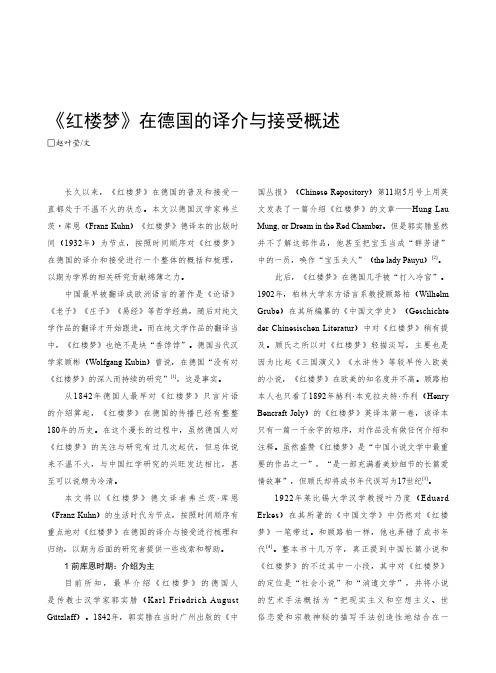
《红楼梦》在德国的译介与接受概述□赵叶莹/文长久以来,《红楼梦》在德国的普及和接受一直都处于不温不火的状态。
本文以德国汉学家弗兰茨·库恩(Franz Kuhn)《红楼梦》德译本的出版时间(1932年)为节点,按照时间顺序对《红楼梦》在德国的译介和接受进行一个整体的概括和梳理,以期为学界的相关研究贡献绵薄之力。
中国最早被翻译成欧洲语言的著作是《论语》《老子》《庄子》《易经》等哲学经典,随后对纯文学作品的翻译才开始跟进。
而在纯文学作品的翻译当中,《红楼梦》也绝不是块“香饽饽”。
德国当代汉学家顾彬(Wolfgang Kubin)曾说,在德国“没有对《红楼梦》的深入而持续的研究”[1],这是事实。
从1842年德国人最早对《红楼梦》只言片语的介绍算起,《红楼梦》在德国的传播已经有整整180年的历史。
在这个漫长的过程中,虽然德国人对《红楼梦》的关注与研究有过几次起伏,但总体说来不温不火,与中国红学研究的兴旺发达相比,甚至可以说颇为冷清。
本文将以《红楼梦》德文译者弗兰茨·库恩(Franz Kuhn)的生活时代为节点,按照时间顺序有重点地对《红楼梦》在德国的译介与接受进行梳理和归纳,以期为后面的研究者提供一些线索和帮助。
1 前库恩时期:介绍为主目前所知,最早介绍《红楼梦》的德国人是传教士汉学家郭实腊(Karl Friedrich August Gützlaff)。
1842年,郭实腊在当时广州出版的《中国丛报》(Chinese Repository)第11期5月号上用英文发表了一篇介绍《红楼梦》的文章——Hung Lau Mung, or Dream in the Red Chamber。
但是郭实腊显然并不了解这部作品,他甚至把宝玉当成“群芳谱”中的一员,唤作“宝玉夫人”(the lady Páuyu)[2]。
此后,《红楼梦》在德国几乎被“打入冷宫”。
1902年,柏林大学东方语言系教授顾路柏(Wilhelm Grube)在其所编纂的《中国文学史》(Geschichte der Chinesischen Literatur)中对《红楼梦》稍有提及。
红楼梦重点知识点归纳
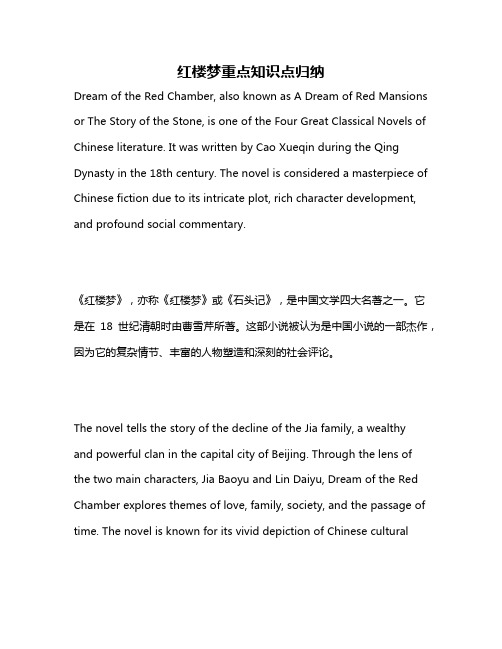
红楼梦重点知识点归纳Dream of the Red Chamber, also known as A Dream of Red Mansions or The Story of the Stone, is one of the Four Great Classical Novels of Chinese literature. It was written by Cao Xueqin during the Qing Dynasty in the 18th century. The novel is considered a masterpiece of Chinese fiction due to its intricate plot, rich character development, and profound social commentary.《红楼梦》,亦称《红楼梦》或《石头记》,是中国文学四大名著之一。
它是在18世纪清朝时由曹雪芹所著。
这部小说被认为是中国小说的一部杰作,因为它的复杂情节、丰富的人物塑造和深刻的社会评论。
The novel tells the story of the decline of the Jia family, a wealthyand powerful clan in the capital city of Beijing. Through the lens of the two main characters, Jia Baoyu and Lin Daiyu, Dream of the Red Chamber explores themes of love, family, society, and the passage of time. The novel is known for its vivid depiction of Chinese culturaltraditions and customs, as well as its commentary on the ethical dilemmas faced by its characters.小说讲述了贾家的衰败之事,贾家是一家富有强大的家族,位于北京京城。
红楼梦主要内容300字
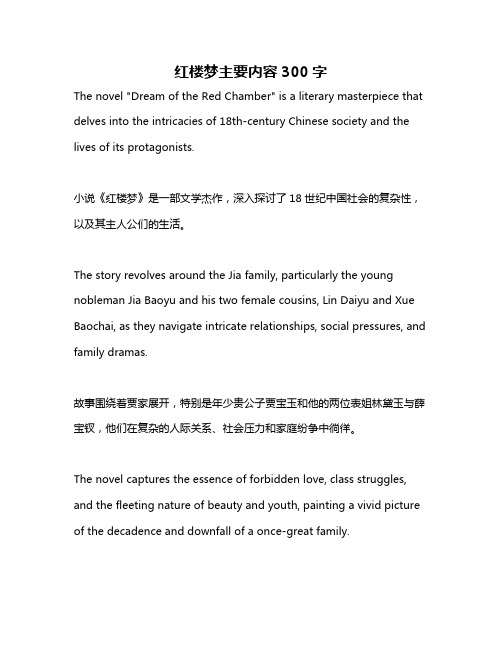
红楼梦主要内容300字The novel "Dream of the Red Chamber" is a literary masterpiece that delves into the intricacies of 18th-century Chinese society and the lives of its protagonists.小说《红楼梦》是一部文学杰作,深入探讨了18世纪中国社会的复杂性,以及其主人公们的生活。
The story revolves around the Jia family, particularly the young nobleman Jia Baoyu and his two female cousins, Lin Daiyu and Xue Baochai, as they navigate intricate relationships, social pressures, and family dramas.故事围绕着贾家展开,特别是年少贵公子贾宝玉和他的两位表姐林黛玉与薛宝钗,他们在复杂的人际关系、社会压力和家庭纷争中徜徉。
The novel captures the essence of forbidden love, class struggles, and the fleeting nature of beauty and youth, painting a vivid picture of the decadence and downfall of a once-great family.这部小说捕捉了禁忌之爱、阶级斗争以及美丽与青春的易逝本质,绘制了一个曾经伟大家族的颓废和沦落的生动画卷。
Through its rich tapestry of characters and intricate plotlines, "Dream of the Red Chamber" offers a profound commentary on the human condition, exploring themes of love, desire, mortality, and the fickle nature of fate.通过丰富的人物形象和错综复杂的情节,实现了一种对人类命运的深刻评论,探讨了爱情、欲望、死亡以及命运多变的主题。
《红楼梦》德文译本研究综述

《红楼梦》德文译本研究综述红楼梦是中国文学史上最著名的长篇小说,全书共一千万文字,是许多学者研究的重点。
近年来,德语译本研究成为一个热门话题,以下是全面介绍关于《红楼梦》德语译本研究的综述。
一、历史概况《红楼梦》这部小说自1791年完成到1906年,在欧洲被翻译成德语的历史可追溯到1790年的拉德译本,其后还有安福勒比、瓦尔克、弗罗伊施鲍姆、古特曼、威林和埃斯特拉夫拉等学者的译本。
这些译者把《红楼梦》的故事内容翻译出来,使德语读者也能了解《红楼梦》这部小说。
二、翻译类型《红楼梦》的德语译本主要分为两类:一是全书翻译,以瓦尔克和埃斯特拉夫拉的翻译最著名;二是部分翻译,以1840年安福勒比的部分文章翻译最著名。
通过这两类德语译本,德语读者可以更好地理解《红楼梦》的内容。
三、文献分析通过对《红楼梦》德语译本文献的分析,可以发现,早期德语译本集中在1790年以前,包括拉德、安福勒比等译者。
19世纪瓦尔克、弗罗伊施鲍姆、古特曼、威林和埃斯特拉夫拉等翻译者把《红楼梦》完整地翻译成德语。
他们不仅翻译出了小说的情节,还翻译了红楼梦中的文言文,使得德语读者能够更好地理解小说内容。
四、研究成果从近几的研究成果来看,德语译本的研究取得了长足的进步。
最著名的是由埃斯特拉夫拉在1906年翻译的德语译本。
他的翻译不仅准确,而且具有独特的语言风格,使德语读者能够更容易理解小说的内容。
也有研究发现,19世纪的德语译本比20世纪的译本更有启发性,可以为当前的学者提供译研参考。
五、研究缺口然而,德语译本研究也有一些缺口。
一方面,一些研究者都集中在20世纪以前的译本上,忽略了20世纪以后的译本,从而缺乏对20世纪以后德语译本研究的全面性和准确性。
另一方面,现存的语译本大多是19世纪的,并没有得到充分的研究,仍需要进一步的深入研究,以更好地理解《红楼梦》的含义。
综上所述,《红楼梦》德语译本研究取得了可喜的进展,但也存在一些缺口,仍需要进行深入研究,使德语读者能够更好地理解《红楼梦》的内涵。
中国名著《红楼梦》在国外
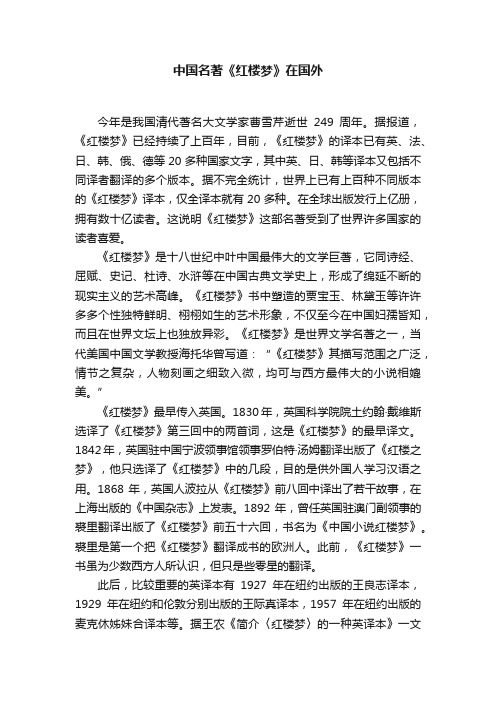
中国名著《红楼梦》在国外今年是我国清代著名大文学家曹雪芹逝世249周年。
据报道,《红楼梦》已经持续了上百年,目前,《红楼梦》的译本已有英、法、日、韩、俄、德等20多种国家文字,其中英、日、韩等译本又包括不同译者翻译的多个版本。
据不完全统计,世界上已有上百种不同版本的《红楼梦》译本,仅全译本就有20多种。
在全球出版发行上亿册,拥有数十亿读者。
这说明《红楼梦》这部名著受到了世界许多国家的读者喜爱。
《红楼梦》是十八世纪中叶中国最伟大的文学巨著,它同诗经、屈赋、史记、杜诗、水浒等在中国古典文学史上,形成了绵延不断的现实主义的艺术高峰。
《红楼梦》书中塑造的贾宝玉、林黛玉等许许多多个性独特鲜明、栩栩如生的艺术形象,不仅至今在中国妇孺皆知,而且在世界文坛上也独放异彩。
《红楼梦》是世界文学名著之一,当代美国中国文学教授海托华曾写道:“《红楼梦》其描写范围之广泛,情节之复杂,人物刻画之细致入微,均可与西方最伟大的小说相媲美。
”《红楼梦》最早传入英国。
1830年,英国科学院院土约翰·戴维斯选译了《红楼梦》第三回中的两首词,这是《红楼梦》的最早译文。
1842年,英国驻中国宁波领事馆领事罗伯特·汤姆翻译出版了《红楼之梦》,他只选译了《红楼梦》中的几段,目的是供外国人学习汉语之用。
1868年,英国人波拉从《红楼梦》前八回中译出了若干故事,在上海出版的《中国杂志》上发表。
1892年,曾任英国驻澳门副领事的裘里翻译出版了《红楼梦》前五十六回,书名为《中国小说红楼梦》。
裘里是第一个把《红楼梦》翻译成书的欧洲人。
此前,《红楼梦》一书虽为少数西方人所认识,但只是些零星的翻译。
此后,比较重要的英译本有1927年在纽约出版的王良志译本,1929年在纽约和伦敦分别出版的王际真译本,1957年在纽约出版的麦克休姊妹合译本等。
据王农《简介〈红楼梦〉的一种英译本》一文的介绍,王良志的译本是一个节译本,“译者把《红楼梦》重新加以剪裁,使整个译本变成了贾宝玉和林黛玉的恋爱故事”;在人名翻译上也采取一种“自由式”的意译法,如把“黛玉”译成“黑玉”,“袭人”译成“弥漫着的香气”,“平儿”译成“忍耐”,“鸳鸯”译成“忠实的鹅”等。
红楼梦内容简介30字左右

红楼梦内容简介30字左右"The Dream of the Red Chamber" is one of China's Four Great Classical Novels. It tells the story of a wealthy and influential Jia family, focusing on the love between Jia Baoyu, Lin Daiyu, and Xue Baochai.《红楼梦》是中国四大名著之一。
作品以贾家为背景,讲述了贾宝玉、林黛玉和薛宝钗之间的爱情故事。
The novel explores themes of love, family, power, and societal expectations. It delves into the complexities of human emotions, desires, and relationships, providing a detailed portrayal of life in a wealthy household during the Qing Dynasty.小说探讨了爱情、家庭、权力和社会期望等主题。
作品深入探讨了人类情感、欲望和人际关系的复杂性,详细描绘了清朝富贵家庭的生活。
Through its vivid characters and intricate plot, "The Dream of the Red Chamber" offers a profound reflection on the transient nature of life and the inevitability of change. It presents a poignant commentaryon the clash between tradition and modernity, as well as the consequences of societal norms and expectations.通过生动的人物和精心编织的情节,《红楼梦》深刻反映了生命的短暂和变化的必然性。
红楼梦世界语赏析
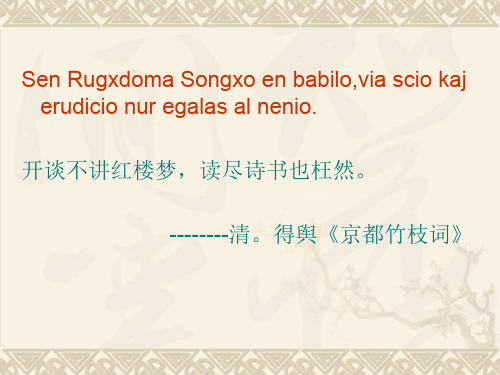
kiu iniciatis kompiladon de la historio de la cxinaj romanoj kaj noveloj, donis en sia 《Konciza Historio de la Cxinaj Romanoj kaj Noveloj》(1923, kun propra antauxparolo) specialan cxapitron (la 24-an) al 《Rugxdoma Songxo》 kaj, alalizante cxiujn kondicxojn kaj problemojn, konklude konsentis kun la tezo pri gxia auxtobiografieco; cetere,en la 27-a cxaptiro, farante komparon kun la romano 《Junaj Herooj》, aperinta poste kun iaflanka imito al 《Rugxdoma Songxo》, li montris kun aparta emfazo:
Eldono:自雕版印刷发明之后, 各梓印本,以及与之同时并存 的各种手抄本,统称为版本。 《红楼梦》自面世以来,其流 传方式主要有二,一为过录抄 本,一为镌板付印。曹雪芹的 《红楼梦》原著为八十回,后 四十回是他人续作,《红楼梦》 世译本是参考了多个版本而最 终定稿的。
Cao Xueqin (1724-1764) estis flagano de la dinastio Qing. Lia familio sklavigxis al la mancxuroj en la lastaj jaroj de la dinastio Ming, apartenis al Baoyi post la fondigxo de la dinastio Qing, restante sklava en la imperiestra familio; liaj prapatroj estis indigxenoj de la gubernio Fengrun de la province Hebei; en la lastaj jaroj de la dinastio Ming, lia praavo, kaptite de mancxura armeo, farigxis sklavo.Lia praavino servis kiel vartistino de la imperiestro Kangxi en lia infaneco, dank’al kio kvar homoj el tri generacioj de la familio Cao sinsekve oficis en Nankino kiel cxefoj de tekstila bruoo kaj farigxis fidelaj favoratoj de la imperiestro,
《红楼梦》德译书名推敲

︽红楼梦︾德译书名推敲205《红楼梦》德译书名推敲①[德]史华慈(Rainer Schwarz )文姚军玲译从1932年以来,德国读者就知道由弗兰兹·库恩(Franz Kuhn )翻译的中国名著《红楼梦》节本Der Traum der roten Kammer 。
据说,这个节译本在三十年前就已经销售了九万本。
这一个或那一个习惯思索的读者可能会提出这样的问题:der Traum der roten Kammer “红色小房间的梦”到底是什么意思呢欧洲大学出版社出版的第一部德文全译本的尝试,本来是重新研究德译书名的良机,遗憾的是,出版人坐失良机。
他或者根本没有想到,或者认为用读者熟悉的书名,就可以少花一些广告费。
不管怎样,他保留了库恩老版本的书名,只是用…der Roten Kammer …代替了…der roten Kammer …。
这样做,根据德文正字法的规则,就变成了类似德累斯顿的有名“绿色穹顶”(das Grüne Gew lbe )的专有名词。
因此书名就更神秘了。
那么,der Traum der roten Kammer 是什么意思呢?先把中国特有的rote Kammer 放到一边去,考虑一下二〇一〇年第六辑206der Traum der…Kammer是什么意思?梦是脑力活动的一种,事实上只有生物才能做梦,尤其人———这个“万物之冠”———善于做梦。
喜欢狗的人都知道,狗也会做生动的梦。
由此推测,其他的脊椎动物大概也会做梦。
至于无脊椎动物是否会做梦,科学直到现在还没有定论。
在诗歌中,还有另外一种形式的梦:“小溪和湖泊在冰下睡觉,森林在酣梦”这是德国童谣中的梦的描写。
或许rote Kammer“红色的小房间”也同样做梦?梦想过去的黄金时代梦想更可爱的房客?梦想早就该做的修缮?都不是。
为表达谁在做梦、梦想什么、在什么情况下做梦,德语有好几种方式。
第一种是使用简单的第二格来表达谁做梦:Eduards Traum“爱德华的梦”②是指爱德华做的一场梦。
弗朗茨·库恩《红楼梦》德译本译后记研究

弗朗茨·库恩《红楼梦》德译本译后记研究杨柳【摘要】摘要:弗朗茨·库恩的《红楼梦》德译本是一个非常成功的变译个案。
译本的译后记深入探讨了《红楼梦》的主要情节、艺术特征、哲学思想及核心价值。
通过这篇译后记,细致考察库恩在向西方读者译介《红楼梦》的过程中突破西方主流价值对中国文化的偏见、颠覆刻板的中国形象、发掘《红楼梦》的现代价值、构建多元文化视角的种种努力,并探究库恩通过译介《红楼梦》而建构的中国形象,对西方现代“自我形象”的影响和作用。
【期刊名称】河南理工大学学报(社会科学版)【年(卷),期】2017(018)004【总页数】7【关键词】弗朗茨·库恩;《红楼梦》德译本;译后记;文化镜鉴【文献来源】https:///academic-journal-cn_journal-henan-polytechnic-university-social-sciences_thesis/0201226567388.html杨柳.弗朗茨·库恩《红楼梦》德译本译后记研究[J].河南理工大学学报(社会科学版),2017,18(4):074-080.弗朗茨·库恩被西方学人誉为“中国语言专家”“中国小说文学的发现者”“中国文化的介绍人”“伟大的中国文学翻译家”“中西文化的媒介人”等。
他的《红楼梦》德译本是一个非常成功的变译个案,自1932年面世以来在西方世界形成了广泛的影响[1]。
“变译指译者根据特定条件下特定读者的特殊需求,采用增、减、编、述、缩、并、改等变通手段摄取原作有关内容的翻译活动”[2]。
成功的变译需要译者具备高超的语言文化修养,深入了解原本,熟悉译入语文化,并使用相应的策略来强化原作的使用价值,以满足读者的特殊需求,达到更高的社会效益。
库恩博士在处理《红楼梦》原著时,“把赞助机制的约束、译语读者的需要和个人的追求近乎完美地结合为一体”[3],既保存原著之精华,又照顾到读者的需要。
- 1、下载文档前请自行甄别文档内容的完整性,平台不提供额外的编辑、内容补充、找答案等附加服务。
- 2、"仅部分预览"的文档,不可在线预览部分如存在完整性等问题,可反馈申请退款(可完整预览的文档不适用该条件!)。
- 3、如文档侵犯您的权益,请联系客服反馈,我们会尽快为您处理(人工客服工作时间:9:00-18:30)。
Der Traum der Roten Kammer
Die Qianlong-Regierungsperiode Mitte des 18. Jahrhunderts gilt als die Blütezeit der Qing-Dynastie, allerdings entstand schon damals ein Roman, der den Untergang der feudalen Gesellschaft prophezeite und ihn gleichzeitig betrauerte. Dies ist der von Cao Xueqin verfasste Roman "Der Traum der roten Kammer".
"Der Traum der roten Kammer" gilt als ein Monument unter den klassischen chinesischen Romanen. Dieses großartige Roman basiert auf den Erfahrungen, die der Autor Cao Xueqin im Laufe des langsamen wirtschaftlichen Abstiegs seiner Familie gemacht hat und die er in genialer Erzähltechnik und mit Hilfe seiner klassischen Bildung ausformulierte. Cao Xueqins Großvater war ein bedeutender Beamter unter der Regierung von Kaiser Kangxi, daher wuchs Cao Xueqin in einer wohlhabenden Familie auf. Später fiel die Familie Cao in Ungnade und das Vermögen wurde konfisziert. Die Familie Cao zog vom Süden des Landes nach Beijing und der junge Cao Xueqin lebte in armseligen Verhältnissen. Bis zu seinem Lebensabend führte Cao Xueqin ein Leben in Zurückgezogenheit in einem westlichen Vorort von Beijing, wo er unter schwierigen
äußeren Bedingungen die ersten 80 Kapitel seines Romans "Der Traum der roten Kammer" verfasste. Kurz darauf starb Cao Xueqin nach schwerer Krankheit.
Die Manuskripte des Romans "Der Traum der roten Kammer", der auch unter dem Titel "Geschichte eines Steins" bekannt ist, wurden bereits vor dem Tod Cao Xueqins verbreitet. Nach seinem Tod bearbeitete ein Literat namens Gao E den Text und schrieb, entsprechend den von Cao Xueqin hinterlassenen Unterlagen und Skizzen, die letzten 40 Kapitel und vollendete so den Roman.
"Der Traum der roten Kammer" ist ein enzyklopädischer Roman, der Beschreibungen des Lebens aller Gesellschaftsschichten des damaligen China enthält. Es werden sämtliche Bereiche des Alltagslebens von den Aktivitäten der Oberschicht bis zu den Tätigkeiten der normalen
Bevölkerung beschrieben und so ein Überblick über das gesellschaftliche Leben während der Qing-Dynastie geboten.
Im Roman "Der Traum der roten Kammer" beschreibt Cao Xueqin hauptsächlich das Schicksal von vier verschiedenen Adelsfamilien und zwar den Familien Jia, Wang, Shi und Xue. Später fokussiert sich die Handlung auf die Familie Jia und der Hauptschauplatz ist der Garten der
Großen Aussicht (Daguanyuan). Anhand dieses überschaubaren Ausschnitts der Gesellschaft werden die Beziehungen der Familienmitglieder - und hier vor allem der Frauen - zur Außenwelt und auch untereinander detailgetreu geschildert und der Untergang der Familie Jia nachgezeichnet.
Die Schilderung der Figuren in dem Roman ist ausgesprochen gut gelungen. Es werden mehr als 700 Personen beschrieben und über 100 davon sind typische Charaktere. Cao Xueqins Darstellungen der komplizierten psychologischen Befindlichkeit besonders der Hauptdarstellerinnen ist einfühlsam und tiefgreifend. Mit großer Sympathie zeigt er ihre Erwartung an das Leben und speziell ihre Sehnsucht nach Liebe, wobei er sowohl ihre reiche,
tiefgründige Menschlichkeit, als auch die Einengung durch die Umwelt und die traditionelle Gesellschaft ausführlich beschreibt, wodurch die geschilderten Figuren sehr plastisch wirken.
Der Roman "Der Traum der roten Kammer" verfügt über einen beispiellos hohen künstlerischen Wert. Seine Ausdrucksweise, seine Struktur und Charakterisierung der Figuren stellen den
Höhepunkt in der klassischen chinesischen Romanliteratur dar.。
